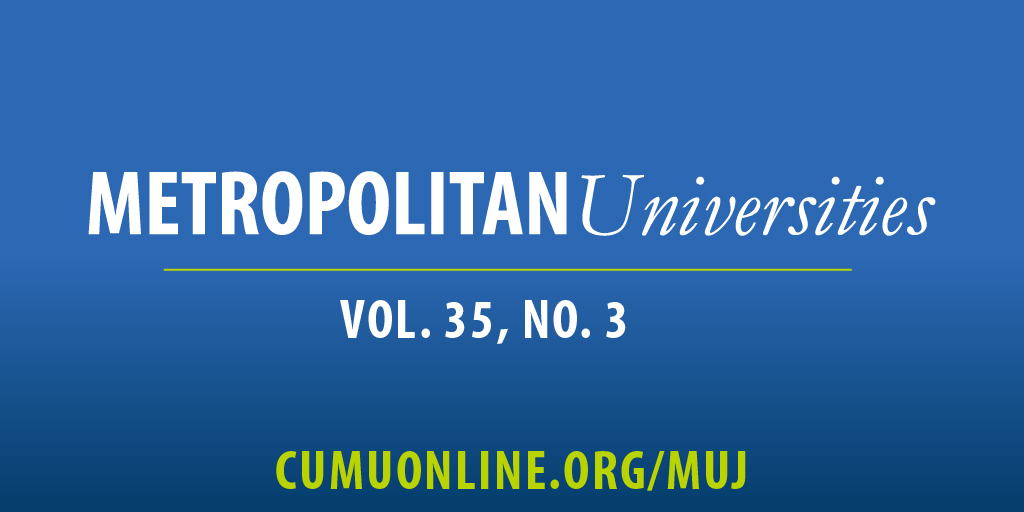Tactical to Transformational: Reclaiming the Strategic Purpose of a Metropolitan Campus
DOI:
https://doi.org/10.18060/28294Keywords:
community-engaged scholarship, university-community partnerships, strategic planAbstract
In the fall of 2019, our large southeastern metropolitan university launched a campus strategically situated in downtown Orlando. As we all remember, in the spring of 2020, as our campus was starting to build momentum as a student and community-centered hub, the world shut down because of a global pandemic. Our challenges over the last several years have been multifaceted. Our university lost key administrators who championed the efforts of the new campus and we have been trying to reclaim the vision and purpose of this space. We have also had a dearth of faculty engagement at the new campus partly because of so many remote courses and meetings. These challenges impact all stakeholders involved with the downtown campus. To reclaim our purpose, we interviewed key stakeholders (N = 21) connected to the university and/or the community to then use their perspectives on the downtown campus as well as their thoughts on community-engaged scholarship (CES) to create a strategic plan to move forward. We have included our strategic plan and our seven primary goals or objectives that were determined based on stakeholder feedback.
Keywords: community-engaged scholarship, university-community partnerships, strategic plan
References
References
Badgett, M. V. L. (2015). The public professor: How to use your research to change the world.
NYU Press.
Bok, D. (2009). Universities and the future of America. Duke University Press.
Brazzell, D. (2019). Public engagement and the future of the university. Retrieved from
https://www.insidehighered.com/views/2019/02/13/engaged-scholarship-can-help-
universities-prove-their-value-opinion.
College Board. (2017). Trends in college pricing 2017. Retrieved from
https://research.collegeboard.org/trends/college-pricing/resource-library
Conway-Turner, K. S. (2019). Higher education’s role in the support of diverse and ever-
changing new American cities: Exploring Buffalo. Metropolitan Universities, 30, 17-25.
DOI: 10.18060/23553
Daly, A. J. & Finnigan, K. S. (2014). Beginning the journey: Research evidence from the
schoolhouse door to Capitol Hill. In. K. S. Finnigan and A. J. Daly (Eds.). Using
research evidence in education: From the schoolhouse door to Capitol Hill (pp. 1-8).
Springer.
Dewey, J. (1916). Democracy and education: An introduction to the philosophy of education. Macmillan Publishing.
Docherty, I. & Smith, D. (2007). Practicing what we preach? Academic consultancy in a multi-
disciplinary environment, Public Money and Management, 27(4), 273-280.
Gordon la Cruz, C. (2018). Community-engaged scholarship: Toward a shared understanding of
practice. The Review of Higher Education, 41, 147-167.
Guarasci, R. (2019). Looking forward in ominous times: Two pathways for urban colleges and
universities. Metropolitan Universities, 30, 35-41. DOI: 10.18060/23552
Kezar, A., Drivalas, Y., & Kitchen, J. A. (2018). Envisioning public scholarship for our time: Models for higher education researchers. Stylus.
Kuttner, P. J., Rawlings, L., & Washington, M. R. (2023). Toward a research and practice
agenda for evaluation in community-campus partnerships. Metropolitan Universities, 34,
-88. DOI: 10.18060/26786
Landis, J. R., Koch, G. G. (1977). The measurement of observer agreement for categorical data.
Biometrics, 33, 159-174.
Lovell, M. R., Bergen, D., Donovan, M., & Altenburg, R. (2019). Strategically connecting a
university to a community. Metropolitan Universities, 30, 72-78. DOI: 10.18060/38356
Miller, A. (2020, January 24). Research universities are a wasted resource. Retrieved from
https://www.chronicle.com/article/Research-Universities-Are-a/247903
National Center for Education Statistics. (2018). Fast facts enrollment. Retrieved from
https://nces.ed.gov/fastfacts/
Ohmer, M. L., Finkelstein, C., Dostilio, L., Durham, A., & Melnick, A. (2022). University-
community engagement during a pandemic: Moving beyond ‘helping’ to public problem-
solving. Metropolitan Universities, 33, 81-91. DOI: https://doi.org/10.18060/25329
Penuel, W. R. & Coburn, C. E. (2014). Introduction to part: Research use at the school and
district level. In. K. S. Finnigan and A. J. Daly (Eds.). Using research evidence in
education: From the schoolhouse door to Capitol Hill (pp. 9-12). Springer.
Pew Research Center. (2017). Sharp partisan divisions in views of national institutions.
Retrieved from https://www.people-press.org/2017/07/10/sharp-partisan-divisions-in-
views-of-national-institutions/
Strawser, M. G. & Carpenter, R. (2019). Engaging millennial faculty. New Forums Press.
Downloads
Published
Issue
Section
License
Copyright (c) 2024 Michael Strawser

This work is licensed under a Creative Commons Attribution 4.0 International License.



